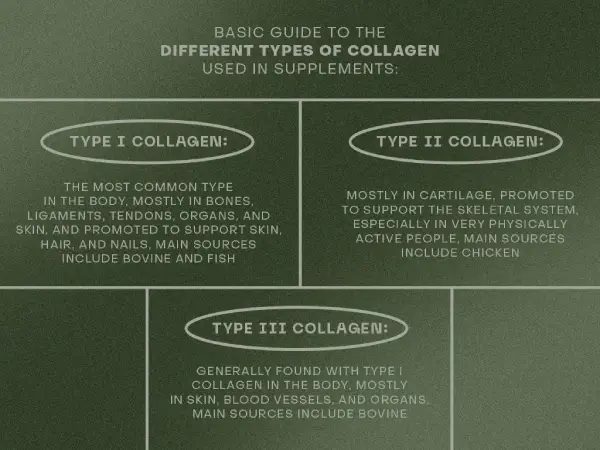Blog
Collagen – What is it & Why is it Important?

What is Collagen?
Collagen is the most abundant protein in the body. It has a triple-helix arrangement and is known as a structural protein because it is used to make connective tissues that hold together, support, and protect all body parts. Connective tissues are found in skin, muscles, tendons, bones, and cartilage – all structures that maintain the body’s physical makeup.
Collagen is composed primarily of three amino acids: glycine, proline, and hydroxyproline (this one is unique to collagen). Although there are several different types of collagen, types I, II and III are the most prevalent in the body. Collagen is vital to the health of our body, particularly for repair and maintenance of healthy skin, our body’s largest organ, and musculoskeletal system, our body’s foundation and movement.
Insufficient Collagen
Insufficient collagen in the body can impair the integrity of many connective tissues, particularly that of the skin. A decline in both the amount (production) and quality (organization) of collagen is associated with skin aging and the formation of wrinkles. Scarring of the skin can occur as a consequence of disorganized collagen deposits by fibroblasts and inflammation during the repair process.
The body makes its own collagen, however production decreases with age. Collagen levels are found to be lower and more disorganized in the skin of older adults, which results in increased skin fragility and laxity as well as decreased skin thickness and vascularization. In other words, as we grow older, our skin becomes thinner, looser, and more fragile.
But it’s not just age – lifestyle factors that contribute to decreased collagen production include high intake of processed foods and added sugar, cigarette smoking, alcohol use, and excessive sun exposure. A poor diet is second to aging when it comes to decreased collagen in the body. The body requires specific nutrients to make collagen, such as protein, vitamin C, zinc, sulfur, and copper.
How do we increase Collagen levels?
The body can also use collagen ingested from food or supplements, which may provide many benefits – collagen supplements have been shown to increase skin elasticity, hydration, and dermal collagen density. Collagen supplementation may additionally be therapeutic for the health of joints, hair, nails, and the gut, as well as for wound healing, muscle growth, weight regulation, and various dermatological conditions. More research is needed for collagen’s medical uses.
Food sources of collagen include bone broths and other food products made from animal parts such as bones, skin, and ligaments. Eating high-quality meats right off the bone may be a good way to increase collagen ingestion. Supplemental collagen is now widely available and promoted for beauty and anti-aging. Collagen supplements come in powder, capsule, and liquid forms. Bovine collagen supplements are most common and made from cow hides. Marine collagen is also available and made from fish skin and bones. Collagen powders are often added to foods (like protein bars and baked goods) and beverages (like coffee and smoothies). The research isn’t clear on whether one collagen supplement is better than another.
Here is a basic guide to the different types of collagen used in supplements:
Type I collagen: the most common type in the body, mostly in bones, ligaments, tendons, organs, and skin, and promoted to support skin, hair, and nails, main sources include bovine and fish
Type II collagen: mostly in cartilage, promoted to support the skeletal system, especially in very physically active people, main sources include chicken
Type III collagen: generally found with type I collagen in the body, mostly in skin, blood vessels, and organs, main sources include bovine
It’s important to note that collagen ingestion from food sources and supplements is not absorbed by the body in its whole form, it’s broken down in the digestive process and enters the bloodstream in its basic units (as individual amino acids or short amino acid chains). To increase bioavailability, collagen supplements are typically hydrolyzed (already broken down), and known as collagen peptides (or collagen hydrolysates). There is no guarantee that collagen peptides will be used to make collagen, they are simply added to our amino acid pool and the body chooses how to use them based on what functions have priority at the time. Additionally, most people who eat a well-balanced diet are likely consuming enough protein from various sources to support collagen production.
Therefore, the idea of using collagen foods and supplements is to supply the body with the basic ingredients it needs to make collagen – providing these directly and in ample amounts makes it likely that the body will make more collagen if it needs to. Furthermore, as previously mentioned, benefits have been experienced from using supplemental collagen. These benefits are probably more pronounced in individuals who need support for collagen production based on age, certain conditions (related to connective tissues), or lifestyle factors.
The good thing is that collagen supplementation is generally safe with no reported adverse events. High quality sources should be used (organic, grass-fed), as there’s the possibility that animal bones contain heavy metals and toxins that are extracted into supplement form along with collagen.
In our professional opinion: food and supplemental sources of collagen are good sources of protein that can be part of a healthy diet and even provide health benefits. Collagen is both safe and nourishing to the body. Of course, it is always recommended to consume natural and whole sources of protein as part of a wholesome diet and to promote collagen production in the body. Emphasis should also be placed on improving lifestyle factors to decrease collagen decline and/or damage. If you would like to explore this further and find out the best way to use collagen for yourself – set up a consultation with one of our naturopathic doctors at LIVV!
Written by Jordan Valdez, RDN
References
Choi FD, Sung CT, Juhasz ML, Mesinkovsk NA. Oral Collagen Supplementation: A Systematic Review of Dermatological Applications. J Drugs Dermatol. 2019;18(1):9-16.
https://www.todaysdietitian.com/newarchives/0319p26.shtml
https://www.vitalproteins.com/blogs/stay-vital/collagen-peptides-types#
https://lpi.oregonstate.edu/mic/health-disease/skin-health#nutrients
https://www.hsph.harvard.edu/nutritionsource/collagen/


